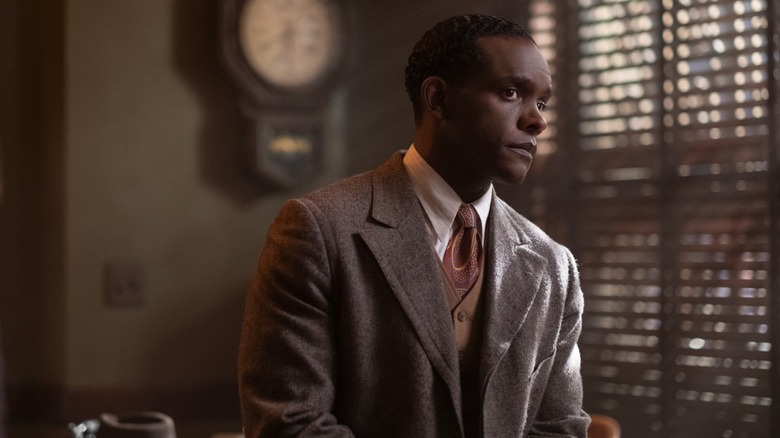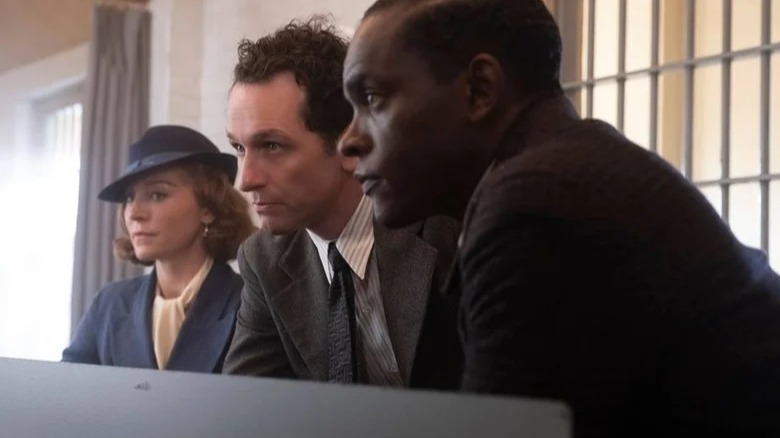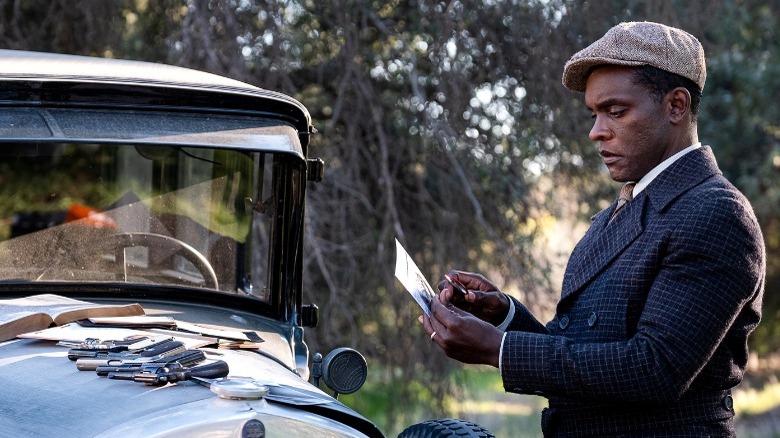What Perry Mason's Chris Chalk Finds Most Depressing About The Series
In season 2 of HBO's "Perry Mason," investigator Paul (Chris Chalk) is one of the show's most interesting characters. A Black man working as a beat cop in 1930s Los Angeles, Paul is intimately familiar with all the ways the so-called justice system works against him. From virulent racism to insidious prejudice, Paul has dealt with plenty of hardship, and come away with a healthy sense of distrust for pretty much everyone but his own family. An investigator for Perry Mason (Matthew Rhys) on the side, he's clever and resourceful, and together with his supportive and curious wife Clara (Diarra Kilpatrick), he's a pivotal part of the lawyer's team. Paul and Clara's marriage is also the sweetest part of an often-cynical show.
That cynicism is unfortunately well-earned, as "Perry Mason" tackles social issues that are just as ubiquitous today as they were nearly a century ago. The show's first two seasons have featured cases involving addiction, sexism, immigration, sex work, and racial profiling, not to mention the media's knack for sensationalizing crimes and pumping out misinformation. In a recent interview with GQ, Chalk told the outlet that playing a Black man in the '30s isn't a stretch for him, given how similar the state of race relations is in America today. "People often ask, 'Is it hard to play Paul?'" he said. "And I'm like, 'Yo, are you aware of the way the world is today?'"
'We're still doing this?'
The actor is frank about the still-prevalent anti-Black violence that's echoed in the show. "All I have to do is remember that there's less that I can say and a higher chance of dying," Chris Chalk told the outlet, before adding, "Well, I can't even say a higher chance of dying. A higher chance of no one giving a s*** that I died." It's a painfully truthful statement, one that the "Perry Mason" plot bears out: the titular character, a white man, is considered radical for actually caring about the rights or wellbeing of people of color during the ongoing Jim Crow era. Paul, meanwhile, sometimes comes face-to-face with people who clearly want him dead, including some who claim to be on the side of justice.
"That's maybe the most depressing quality about doing Perry Mason," Chalk said when the GQ interviewer pointed out that "the more things change, the more they stay the same." He continued:
"Realizing the same things are happening by the same people and the same audience is watching and we seem to be crippled and unable to shift out of this monotony. And I think that's why shows like this are important because hopefully we'll see it and go, 'We're still doing this? Time to grow up, guys.'"
'Who is Paul going to consider his family?'
Of course, any one TV show can't heal the hate in the world, but we are living through a shockingly ahistorical time in which historical stories centering Black characters — which, to be clear, are always vital — are unambiguously necessary. With states legislating references to Black history out of schools, there's more need than ever for stories that shine a spotlight on the historically accurate experiences of characters of color. That's exactly what "Perry Mason" aims for with Paul's arc, which most recently saw him navigate an accusation from a family member that he's been acting like an "Uncle Tom."
Chris Chalk said his character was concerned with being as safe as possible until he began working with Mason. Their relationship has allowed him to attempt to gain a foothold in an unfair world, even if it means mingling with some powerful, scary people. "His whole life has been, 'I'm going to be a good dude. I still love my community, but I'm going to get some white favor,'" Chalk told the outlet. The actor says the character will continue to evolve and figure out what he needs to prioritize. "I mean, that's a theme of this season, his family," he said. "So who is Paul going to consider his family, and when is he going to take a not safe action?"
We'll find out as "Perry Mason" season 2 finally comes to a head. The show airs on HBO and HBO Max, with new episodes out Mondays at 9:00 p.m. ET.


